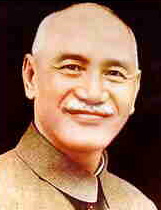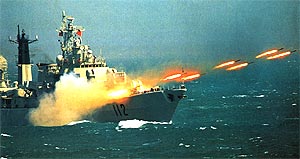 Since the 1950s, the relationship between the People's Republic of China on the mainland and Taiwan, two politico-economic entities whose populations essentially share the same culture and language, has been marked by military tensions, political and propaganda warfare, diplomatic arm-twisting and polemics as well as efforts to open up channels of peaceful communication through academic exchanges, tourism, trade and investment and sports.
Since the 1950s, the relationship between the People's Republic of China on the mainland and Taiwan, two politico-economic entities whose populations essentially share the same culture and language, has been marked by military tensions, political and propaganda warfare, diplomatic arm-twisting and polemics as well as efforts to open up channels of peaceful communication through academic exchanges, tourism, trade and investment and sports.
However, it seems that the attempts to promote peaceful communication and co-existence has always been overwhelmed by more bellicose postures on both sides of the Taiwan Straits as the result of historical claims and ideological animosity, as well as conflicting interests in more global geostrategies involving not only China and Taiwan but also the United States, Japan, two Koreas and Russia.
Taiwan has become a very emotional or passionate subject in Chinese politics since the 1895 Sino-Japanese Shimonoseki Treaty which saw the island ceded to Japan by imperial China after the latter's humiliating defeat by the former in a war. During the 50-year colonial rule of Taiwan, Japan used the island as the springboard for its subsequent southward expansion until it was itself defeated by the United States in the Pacific War in 1945. The initial Japanese planning to invade Malaya and Singapore also took place in colonial Taiwan.
In the early stage of the Cold War (1947-1979), Taiwan self-styled itself and was also regarded by many other countries in the world, particularly the United States, Japan and their allies, as a bastion of anti-communism and bridgehead for the strategic containment of communist China, North Korea and the former Soviet Union.
Then ruled, in a highly authoritarian fashion, by the Nationalist Party (Guamindang) whose military forces and civil administration fled from the mainland after being decisively defeated by the Chinese Communist Party and its People's Liberation Army (PLA) in a three-year civil war (1946-1949), Taiwan embarked on a programme of massive, speedy and rather successful economic development.
Security alliance
The ultimate objective of the Nationalist Party in Taiwan then was to roll back communism by invading the mainland one day. Meanwhile, its security was underwritten by its security alliance with the United States, which has also been a military ally of Japan and South Korea after the Second World War.
Meanwhile, on the mainland, the economic mismanagement by the supporters of Mao Zedong and the political dislocations resulting from incessant factional and ideological struggles within the Chinese Communist Party leadership as well as rank-and-file ensured that poverty and backwardness continued to reign. However, motivated by both ideological as well as ethno-nationalist sentiments, the liberation of Taiwan remained on the top of the agenda.
Ironically, the two modernist and republican parties on both sides of the Taiwan Straits have been ideological forces that were once allies in the early and mid-1920s, sharing a common platform of fighting against Western imperialism and domestic feudalism as well as socio-cultural decadence in the aftermath of the 1911 republican revolution.
 Despite the subsequent breakup of the alliance in the 1927 massacre of the communists in Shanghai by the right-wing Nationalist Party under the leadership of Jiang Jieshi (Chiang Kai Sek,
photo
), both parties fought against the eight-year invasion and attempted occupation of mainland China by imperial Japan from 1937 to 1945 and both cherish even until now the eventual re-emergence of one strong China.
Despite the subsequent breakup of the alliance in the 1927 massacre of the communists in Shanghai by the right-wing Nationalist Party under the leadership of Jiang Jieshi (Chiang Kai Sek,
photo
), both parties fought against the eight-year invasion and attempted occupation of mainland China by imperial Japan from 1937 to 1945 and both cherish even until now the eventual re-emergence of one strong China.
New factors
Meanwhile, since 1972, several new factors or dynamics have emerged to gradually alter the relations between China and Taiwan:
One, the rapprochement between China and the United States and the Sino-US united front against the former Soviet Union: this began in the 1972 visit to Beijing by US President Richard Nixon which was preceded by the successful entry of China into the United Nations replacing Taiwan in 1971; in 1979, formal diplomatic diplomatic relations were established between China and the United States on the premise of 'One China' policy;
Two, in 1980, the bilateral security alliance treaty between the United States and Taiwan was abrogated by the former, and in its place, the 1979 Taiwan Relations Act was enacted to commit US only to supplying arms, not ground troops, for Taiwan's self-defence;
Three, in the late 1970s and 1980s, the emergence of an independent movement in Taiwan challenging the rule of the Nationalist Party which culminated in the inauguration of the Democratic Progressive Party (DPP); the political contest finally led to the lifting of martial rule imposed since 1949 and the democratisation process of Taiwan;
Four, in the aftermath of the disintegration of the former Soviet Union, not only Sino-US relations began to change from being strategic allies to strategic competitors, but the Chinese Communist Party also began to become more ethno-nationalist in its ideology, policies and propaganda in an attempt to re-legitimatise its rule after the loss of appeal of orthodox
communism;
Five, despite the continuation of its one-party rule, China's economic development has taken off after the 1978 reform and opening up process, enhancing its power and influence in the region and the world and giving China, which is also a permanent member of the United Nations' Security Council as well as a nuclear power, more military, political, economic and diplomatic leverages;
 Six, in 1996 when the first direct presidential election was held in Taiwan, China attempted to influence the outcome of the polls by firing missiles near Taiwan causing the United States to send into the Taiwan Straits warships to serve as a deterrence; in any case, an US-educated Nationalist who was perceived by China to be a secret or subtle advocate of Taiwan's independence, Li Denghui (Lee Teng-hui) won the presidency;
Six, in 1996 when the first direct presidential election was held in Taiwan, China attempted to influence the outcome of the polls by firing missiles near Taiwan causing the United States to send into the Taiwan Straits warships to serve as a deterrence; in any case, an US-educated Nationalist who was perceived by China to be a secret or subtle advocate of Taiwan's independence, Li Denghui (Lee Teng-hui) won the presidency;
Seven, in both the 2000 and 2004 presidential elections in Taiwan, a candidate from the Democratic Progressive Party (DPP) which advocates the ultimate independence of Taiwan, Chen Shuibian won to the dismay and fury of Beijing.
From the vantage-point of China, Taiwan continues to be an emotional issue because its liberation or re-union would complete the re-unification process after the return of Hong Kong in 1997 and Macau in 1999. Also, if Taiwan's independence succeeds, it would inflame independent, or as China sees it, separatist, passions in, among other regions, Inner Mongolia, Xinjiang, Northeast China (formerly known as Manchuria), Tibet, Hong Kong and Guangzhou (Canton) leading to a territorial breakup of the entire Chinese state, nation and even civilization.
Chinese on the mainland know not only that territorial breakup had been a feature in Chinese history, but also that even the former Soviet Union could disappear from the world map rather suddenly in 1991.
Democratic freedoms
However, from the perspective of many Taiwanese, a re-union with the mainland under the present one-party rule in Beijing would mean the loss of newly gained democratic freedoms and human rights. Geostrategically, Taiwan is not only a vital position in a international sea-lane of communication linking the Indian Ocean, South China Sea and Western Pacific, but also a geographical divider between Northeast and Southeast Asia as well as a buffer (like South Korea) between China on one hand and the United States and Japan on the other.
To gain direct understanding of the official view of Taiwan on the current situation and its up-to-date relations with China, malaysiakini spoke to Frances Lee, the Director for Public Affairs of Taiwan's Taipei Economic and Cultural Office in Kuala Lumpur.
Reproduced below in a two-part series is the complete interview, carries out via e-mail.
Q: Malaysia, like the United States, Singapore, Britain, Australia and the majority of the member-states of the United Nations, only recognises One China and that the legitimate government of the One China resides in Beijing. How does Taiwan survive and also prosper in such limited international space for so many years?
A: The foreign policy of every country aims to protect and promote its national interests which surely are not necessarily identical with that of China.
In the era of globalisation we will see borders among countries being progressively dismantled and barriers between people removed. Areas of economic cooperation, health concern, environment protection, caring society and so on will play much more significant roles in international relations in the future.
When these regional or international interests run counter to the bilateral interests between two countries, the international or regional interests should prevail. Issues such as health should be independent of politics. Take Taiwan' s bid to participate in the World Health Assembly as an observer for example: it is purely a health issue.
Part 2 will be published on Monday
JAMES WONG WING ON is chief analyst of Strategic Analysis Malaysia. He is a former DAP member of Parliament for Kampar (1990-1995) and a former columnist for the Sin Chew Jit Poh Chinese daily (now Sin Chew Daily). He read political science and economics at Monash University in Melbourne, Australia.

